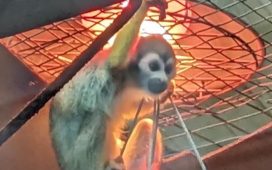Danish government experts have said they are acting with an “abundance of caution” in imposing new restrictions in northern Jutland after a number of cases of a mutation of coronavirus linked to mink.
The country’s prime minister, Mette Frederiksen, had said the measures were being put in place since the mutation of the virus could potentially have an impact on the efficacy of vaccines in development, but the experts stressed on Friday there was as yet no hard evidence to suggest it would.
The World Health Organization also offered a circumspect assessment of the risk from the new mink variant. Soumya Swaminathan, the WHO’s chief scientist, said on Friday it was too early to jump to conclusions about the implications of mutations in the virus found in mink.
“We need to wait and see what the implications are but I don’t think we should come to any conclusions about whether this particular mutation is going to impact vaccine efficacy,” she said. “We don’t have any evidence at the moment that it would.”
The detection of new mutations of coronavirus at a number of mink farms, including a strain that spread to 12 people and was described as of particular concern, had prompted the decision by Denmark to cull 17 million mink on its commercial farms and impose new restrictions on areas in northern Jutland.
Frederiksen’s comments that the strain “could pose a risk that future vaccines won’t work”, however, attracted international attention as she called for immediate action, adding that the “eyes of the world are on us”.
Dr Tyra Grove Krause of the Danish State Serum Institute told reporters on Friday that while researchers did not have “complete evidence”, they were determined to act on the information they had acquired quickly as a precaution while they continued their research.

Responding to whether recent statements and actions had generated “panic”, she added: “There is always a balance of risk. In this case … you need to act in time instead [of] waiting [to] get all the evidence. You need to act in time and stop transmission.”
Confusing the issue, several variants of Covid-19 that have infected mink have been detected in more than 200 human cases in Denmark, but it has been the one cluster of 12 cases that has caused particular concern.
Frederiksen had told a news conference on Thursday: “From tonight, citizens in seven areas of north Jutland are strongly encouraged to stay in their area to prevent the spread of infection.. We are asking you in north Jutland to do something completely extraordinary. The eyes of the world are on us.”
After Frederiksen’s statement, the UK government announced that Denmark would be removed from its safe travel list.
The World Health Organization said on Friday it was looking at biosecurity in other countries where mink were farmed, adding that it was important to prevent the animals and farms becoming reservoir for the disease.
Maria van Kerkhove, the WHO’s technical lead for Covid-19, told a WHO news briefing in Geneva that the transmission of the virus between animals and humans was “a concern”, with a second expert saying the risk of such transmission was higher with mink than it was with other animals.
“Mutations [in viruses] are normal. These type of changes in the virus are something we have been tracking since the beginning. We are working with regional offices … where there are mink farms, and looking at biosecurity and to prevent spillover events,” Van Kerkhove said.













